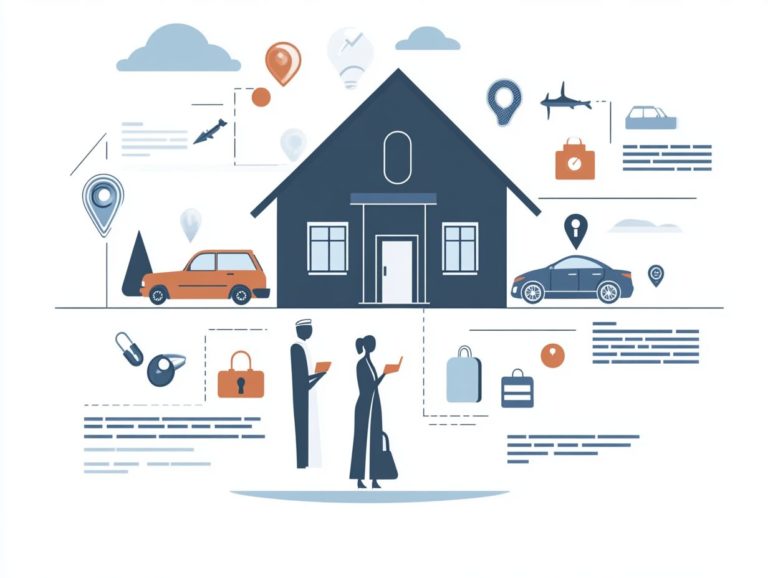5 Types of Coverage You Might Overlook
When it comes to safeguarding your assets and achieving peace of mind, securing the right insurance coverage is essential.
This piece explores five essential insurance options. These are umbrella, flood, identity theft, earthquake, and cyber liability insurance.
It details the importance of adequate coverage. It also debunks misconceptions and gives tips for assessing your insurance needs while saving money.
Continue reading to discover vital protections you may be overlooking.
Contents
Key Takeaways:

Don’t overlook the importance of umbrella insurance. It provides additional liability coverage and can protect you from unexpected financial burdens.
Flood insurance is often overlooked but is essential for protecting your home and belongings from damage caused by floods. Don’t wait until it’s too late to get this coverage.
Identity theft insurance helps cover the costs of recovering from identity theft and protecting your personal information. Don t underestimate the risk consider adding this coverage to your insurance plan.
1. Umbrella Insurance
Umbrella insurance is a vital layer of protection for individuals and businesses. It extends coverage beyond your primary policies, like auto or homeowners insurance.
In today s unpredictable world, having this extra cushion is not just smart it’s essential. This insurance is particularly beneficial if you face various risks.
Imagine you’re in a serious car accident, and the expenses exceed your auto insurance limits. Umbrella insurance covers those additional costs, protecting you from financial fallout.
Businesses can benefit too, especially regarding Employment Practice Liability (EPL), which includes claims like wrongful termination or discrimination. An umbrella policy provides extensive coverage, shielding your finances and letting you focus on your operations.
2. Flood Insurance
Flood insurance protects homeowners and businesses from the financial repercussions of flooding. Standard policies often exclude this risk.
This coverage is crucial for properties in flood-prone areas. Unlike homeowners’ insurance, which covers fire or theft, flood insurance specifically targets water-related disasters.
The National Flood Insurance Program states the average flood claim is around $30,000. Homes with flood insurance recover more quickly and with less financial strain, showing its critical role in asset protection.
3. Identity Theft Insurance
Identity theft insurance covers financial losses from fraudulent activities. In our digital world, personal information is at greater risk than ever.
This insurance alleviates the costs of restoring a stolen identity and covers legal fees that may arise from disputing fraud. It also accounts for lost wages if you need time off work to address these issues.
By understanding the potential costs and securing the right coverage, you can approach recovery with peace of mind.
4. Earthquake Insurance

Earthquake insurance is essential for homeowners and businesses situated in areas with frequent earthquakes, offering crucial coverage for damages caused by earthquakes. These damages are typically excluded from standard homeowners policies.
This insurance protects your property and mitigates financial losses during one of nature’s most unpredictable disasters. When contemplating the need for earthquake insurance, consider the seismic activity in your geographical location; areas near fault lines face a higher risk.
Evaluating the age and structure of your property can reveal insights into its vulnerability. Understanding local building codes and the history of seismic events in your area will aid you in deciding whether investing in earthquake insurance is a prudent choice. Ultimately, it provides peace of mind in the face of potential catastrophe.
5. Cyber Liability Insurance
Cyber liability insurance serves as a crucial shield against the financial repercussions of data breaches, hacking incidents, and various cyber threats. In today s digital world, you can’t afford to be without this vital coverage!
As technology rapidly expands across every industry, the frequency and sophistication of cyber threats have surged, leaving you vulnerable to substantial financial losses. Just consider the recent high-profile ransomware attacks; they underscore how even well-established companies can find themselves ensnared, facing exorbitant ransom demands and disrupted operations.
These incidents not only tarnish reputations but also lead to costs associated with customer notifications and potential legal actions. With cyber liability insurance, you gain a vital safety net that covers expenses tied to data recovery, legal fees, and even regulatory fines.
This coverage helps you mitigate the impact of relentless cyber risks, no matter the size of your business.
What Is the Importance of Having Adequate Insurance Coverage?
Adequate insurance coverage is essential for safeguarding your assets and providing financial security against unforeseen events. It allows you to weather life’s storms without incurring devastating losses. Without proper coverage, you risk losing a lot of money that could jeopardize your stability and future.
In an unpredictable world filled with accidents, natural disasters, and liability claims, having the right insurance policies in place becomes a cornerstone of prudent financial planning and peace of mind. This financial protection not only mitigates the impacts of unexpected incidents but also fosters a sense of security that enables you to thrive in your daily activities.
For instance, homeowners’ insurance shields you from property damage due to events like fires or floods, while health insurance alleviates the burden of medical expenses that can arise from sudden illnesses or accidents. Meanwhile, liability insurance, which protects you from lawsuits or claims against you, ensures that your business can operate without the fear of crippling lawsuits.
Collectively, these policies create a safety net that allows you to focus on your goals without the constant worry of financial vulnerability.
What Are the Risks of Not Having These Types of Coverage?
Not having adequate insurance coverage leaves you vulnerable to significant risks, potentially leading to overwhelming financial loss and instability when unexpected events, like accidents or natural disasters, occur.
Consider the small business owner who experiences a fire without sufficient property insurance. Their entire operation could be at risk, unable to recover from the loss of inventory and physical space.
Similarly, think about an individual who encounters a medical emergency but lacks proper health insurance. The staggering medical bills that follow can quickly accumulate, often resulting in debt that impacts their financial future for years to come.
These examples show how unpreparedness can lead to serious problems, emphasizing the critical importance of comprehensive insurance to protect both personal assets and ensure long-term stability.
How Can One Determine the Right Amount of Coverage for Their Needs?

Determining the right amount of insurance coverage requires a careful assessment of your personal or business needs, your financial goals, and an understanding of potential risks in various scenarios.
To kick off this process, take a close look at your current assets. Property, savings, and investments all play a critical role in deciding how much coverage you need.
Next, it s essential to evaluate your liabilities, such as loans, credit card debt, or mortgage balances. These financial obligations need protection.
Don t forget to address your risk tolerance. Some may prefer comprehensive coverage, while others might lean toward a more minimal approach.
Consulting with insurance experts can provide invaluable insight. They can help you identify any gaps in coverage and ensure that you consider all necessary factors, like life changes or business expansions.
What Are the Common Misconceptions About Insurance Coverage?
Common misconceptions about insurance coverage can lead you to underestimate the importance of having adequate protection. This often results in insufficient financial planning and unexpected losses.
Many people mistakenly view insurance as an unnecessary expense rather than a crucial safety net. This misconception may keep you from seeing the substantial benefits that comprehensive coverage can offer during unforeseen circumstances.
The belief that all types of insurance are prohibitively expensive might also hold you back from exploring options that could actually fit your budget.
By understanding the true value of insurance, you can make informed decisions that help safeguard your financial future against potential liabilities and risks.
Clarifying these misunderstandings can give you a deeper appreciation for how the right coverage can help mitigate significant financial hardships.
How Can One Save Money on Insurance Coverage?
Saving money on insurance coverage is entirely within your reach, thanks to some strategic planning and a savvy approach to the various discounts and policy options available to you.
By carefully reviewing your individual needs and adjusting your insurance strategy, you can uncover opportunities to trim costs without sacrificing essential coverage.
Consider bundling multiple policies like home and auto as this can lead to substantial reductions in your premiums.
Keeping an eye on your credit score is also vital. Many insurers offer lower rates to those who demonstrate financial responsibility.
Regularly shop around and compare quotes from different providers to ensure that you’re securing the best deal possible.
Some insurers even provide discounts for safe driving records, good grades, or membership in certain organizations, all of which can enhance your savings even further.
What Are the Steps to Take When Assessing Insurance Needs?
Assessing your insurance needs demands a systematic approach, beginning with a thorough evaluation of your current assets, liabilities, and potential risks to ensure you have the right coverage for your financial security.
This process calls for careful consideration of your personal circumstances, including income stability, family responsibilities, and health status, as well as business-specific factors like operational risks, industry regulations, and employee welfare.
A comprehensive checklist might include questions such as:
- What basic coverage do you currently hold?
- Are there gaps related to events like natural disasters, liability claims, or property damages?
Understanding your future financial goals and life changes such as starting a family or expanding a business is essential. By diligently examining these aspects, you can pinpoint the appropriate types and amounts of insurance necessary to safeguard against unforeseen events.
Frequently Asked Questions

What are the 5 types of coverage that people often overlook?
The 5 types of coverage that people often overlook are: rental car coverage, umbrella insurance, identity theft insurance, pet insurance, and flood insurance.
Is rental car coverage really necessary?
Many people assume their personal auto insurance covers them in a rental car. This is not always true.
Rental car coverage provides extra protection and saves you from unexpected expenses.
Why do I need umbrella insurance?
You need umbrella insurance for extra protection against lawsuits.
This coverage goes beyond the limits of your home and auto insurance and can cover damages that exceed your other policies.
What is identity theft insurance and why is it important?
Identity theft insurance covers costs associated with recovering your identity.
This can include lost wages, legal fees, and credit monitoring services.
Do I really need pet insurance?
Pet insurance can save you from high veterinary bills in case of unexpected illness or accidents.
Imagine not worrying about expensive vet bills when your pet needs care it s a valuable investment for pet owners.
Why should I consider flood insurance?
Many homeowners think their regular home insurance covers flood damage. This is often not the case.
Don t wait until a disaster strikes to protect your home from flooding! Flood insurance safeguards your home and belongings from water damage caused by natural disasters or plumbing issues.






